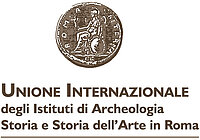Scientific programmes of the École française de Rome for the period 2017 - 2021
Research areas
The research projects in partnership with the École française de Rome for the period 2017-2021 are part of the four thematic areas defined by the Scientific Council:
- Spaces and exchanges
- Standards and societies
- Religions and the divine
- Arts and knowledge
These areas will form the foundations of the research activities of the École française de Rome for the next five years.
Below you will find the projects carried out by the scientific staff and researchers of the EFR, which are supported by the research departments as well as in partnership with other research institutions.
LIST OF SCIENTIFIC PROGRAMMES
Spaces and exchanges
This theme includes research programmes about territories and their settlement in Italy and the Mediterranean area, with a particular focus on how they established, at different levels, the relationships between one another, the phenomena of exchange and frontiers. It also includes research on trade, distribution and mobility, internally as well as between territories.
-
APOLLONIA. Apollonia Illyria (Albania). Survey, excavation and Franco-Albanian archaeological studies
- Section: Antiquity
- Directors: Stéphane Verger, Director of studies at the École Pratique des Hautes Études, Director of UMR 8546 AOROC
- Network of French schools abroad: in collaboration with the École française d’Athènes
-
DIPLURBAINE. Urban diplomacy 12th to 16th centuries: recruitment, costs and management techniques for international relations (Latin Europe, Muslim and Byzantine worlds)
- Section: Middle Ages
- Directors: Paolo Cammarosano, former professor and dean of the Faculty of Letters and Philosophy at the University of Trieste; Patrick Gilli, professor, University Paul-Valéry Montpellier 3, director of EA 4583 CEMM (Centre for Medieval studies, Montpellier); Armand Jamme, Director of research at the CNRS (UMR 5648 – Lyon)
-
PALEO. Diversity of ancient Paleolithic cultural expressions in Italy. Centre / South Interactions
- Section: Antiquity
- Directors: Élisa Nicoud, researcher at the CNRS (UMR 7264 CEPAM); Roxane Rocca, postdoc UMR 7041-ArScAn, team AnTET; Marta Arzarello, researcher, University of Ferrara; Daniele Aureli, postdoc University of Siena; Marco Peresani, associate professor, University of Ferrara
-
TRAN. Transhumant Livestock Farming in Central Italy
-
Sections: Antiquity, Middle Ages
- Director: Stéphane Bourdin, professor at University of Lyon 2
-
-
ELITESIT. Italian elites and European monarchies: evolutions and networks of power (16th-18th centuries)
- Section: Modern and contemporary
- Directors: Albane Cogné, lecturer, University F. Rabelais, Tours (Cethis); Etienne Bourdeu, associate researcher, CESR
-
IOL. Ignobilia oppida Lucanorum. Anonymous sites of the Lucanians - Insediamenti anonimi dei Lucani
- Section: Antiquity
- Directors: Olivier de Cazanove, professor, University Paris 1 Panthéon-Sorbonne; Stéphane Bourdin, professor, University of Lyon 2
-
MEGA. Megara Hyblaea
- Section: Antiquity
- Directors of the programme: Henri Tréziny (CNRS, CCJ) and Jean-Christophe Sourisseau (University of Aix-Marseille)
-
METROPOLES. Metropolises: crisis and mutations in the euro-mediterranean space
- Section: Modern and contemporary
- Director: Dominique Rivière, professeur, Université Paris-Diderot, UMR Géographie-cités
- EFE network: collaboration with the École française d’Athènes and the Casa de Velázquez
-
OSTIEPORTUS. Ostia-Portus, hub of the Roman Empire
This programme is dedicated to the memory of Mireille Cébeillac Gervasoni, who died on March 29, 2017. A long-time researcher on Ostia, she participated in its development with her well-known enthusiasm and dynamism.
- Section: Antiquity
- Directors: Evelyne Bukowiecki from the École française de Rome; Simon Keay from the University of Southampton – British School at Rome; Nicolas Laubry from the École française de Rome; Gloria Olcese from the University of Milan; Renato Sebastiani, from the Soprintendenza Speciale for the Colosseum and the central archaeological area of Rome; Catherine Virlouvet, from the University of Aix-Marseille-Centre Camille Jullian; Fausto Zevi, Sapienza University of Rome and Accademia dei Lincei.
-
ALBANIE. Settlement and territory in the Balkan West (4th-15th centuries: Medieval sites of Komani, Sarda and Lezha, in Albania
- Section: Middle Ages
- Directors: Etleva Nallbani, researcher CNRS-UMR 8167, Orient et Méditerranée [East and Mediterranean]; Elvana Metalla, researcher, archaeological institute of Tirana.
-
SICILE. Sicily and the Mediterranean between the 7th and the 12th century: internal diversity and Mediterranean polycentrism
- Section: Antiquity and the Middle Ages
- Directors: Annliese Nef, lecturer, University Paris 1-Panthéon Sorbonne and member of UMR 8167 Orient et Méditerranée [East and Mediterranean]; Lucia Arcifa, associate professor, University of Catania and School of Specialization in Archaeological Heritage - Syracuse
-
VILLAEADRI. The villas of the eastern Adriatic: forms and chronology of the exploitation of the coast and the islands in ancient times
- Section: Antiquity
- Directors: Audrey Bertrand, lecturer, University Paris-Est Marne-la-Vallée; Emmanuel Botte, University of Aix-Marseille, researcher CNRS, Centre Camille Jullian, UMR 7299; Corinne Rousse, lecturer, University of Aix-Marseille, CNRS, Centre Camille Jullian, UMR 7299
Standards and Societies
This research programme, focusing on Italian and Mediterranean societies, looks at institutions that serve to produce and inculcate standards, (family, school, administrations, moral authorities, churches, legislators, parties and movements ...) , and the means by which the different components within societies make them accept or impose them, explicitly or implicitly, for example by discursive processes (rhetoric, arts, traditions) or social, legal or disciplinary constraints (prohibitions, sanctions, punishment, violence, censorship). There are also projects that question the "application" of the standard, ie how it is perceived and experienced, which implies a particular attention to the relationships of domination, gender, the construction of public space and the different processes of acceptance, internalization, differentiation, reinterpretation, circumvention or transgression.
-
COMMUNAUTES [COMMUNITIES]. In Search of High Medieval Communities: Forms, Practices, Interactions (6th-11th Centuries)
- Section: Middle Ages
- Directors: Geneviève Bührer-Thierry, professor, University Paris1-Panthéon-Sorbonne, LAMOP UMR 8589; Cristina La Rocca, professor University of Padoue, director of the Doctoral school of History-Geography-Anthropology at Venice-Padua-Verona
-
ADMINETR. Administering the foreigner. Mobility, diplomacy and hospitality Italy-Europe (14th-19th century)
- Sections: Middle Ages, modern and contemporary
- Directors: Gilles Bertrand, professor, University of Grenoble-Alpes, senior member of the Institut Universitaire de France (IUF) and member of LUHCIE; Catherine Brice, professor, University of Paris Est Créteil Val-de-Marne, attached to the Centre of Recherche in Comparative European history, senior member of the Institut Universitaire de France (IUF); Naïma Ghermani, lecturer, University of Grenoble-Alpes, junior member of the Institut Universitaire de France (IUF) and member of LUHCIE; Virginie Martin, lecturer, University Paris 1 Panthéon-Sorbonne (IHMC / IHRF); Gilles Montègre, lecturer, University Grenoble-Alpes and member of LUHCIE; Ilaria Taddei, lecturer, University Grenoble-Alpes, affiliated to LUHCIE; Sylvain Venayre, professor, University Grenoble-Alpes and director of LUHCIE
-
PAUVRETE. The Economies of Poverty in the Middle Ages in Mediterranean Europe (9th-15th centuries)
- Section: Middle Ages
- Directors: Sandro Carocci, University of Roma Tor Vergata; Laurent Feller, University Paris 1 Panthéon-Sorbonne; Ana Rodriguez, Investigadora Científica in the Instituto de Historia, Centro de Ciencias Humanas y Sociales, CSIC-Madrid
- EFE network: in collaboration with the Casa de Velázquez
-
FULMEN. Spiritual censorship and long-term government in the Christian tradition (4th-21st centuries)
- Sections: Antiquity, Middle Ages, Modern and contemporary
- Under the high scientific patronage and with the active participation of Agostino Paravicini Bagliani (SISMEL, AIBL)
- General director: Julien Théry-Astruc, University Lumière de Lyon / CIHAM, UMR 5648
- Directors: Fabien Archambault, lecturer, university of Limoges / CRIHAM, EA 4270; Véronique Beaulande-Barraud, lecturer HDR, University of Reims / CERHIC, EA 2616; Irène Favier, lecturer, University of Grenoble Alpes / LARHRA, UMR 5190; Arnaud Fossier, lecturer, University of Bourgogne / Centre Georges Chevrier, UMR 7366; Vincenzo Lavenia, lecturer, University of Macerata, Department of political science; Benoît Schmitz, ATER, École normale supérieure, Paris
-
HOMILLUSTRES. Illustrious men. Metamorphoses and challenges of a multi-memory repertoire, Italy / Europe 1300-1700
- Sections: Middle ages, modern and contemporary
- Directors: Concetta Bianca, professor, University of Florence; Cécile Caby, professor, University Lyon II – CIHAM; Élisabeth Crouzet-Pavan, professeur, University Paris IV-Sorbonne – Centre Roland Mousnier; Clémence Revest, researcher CNRS–Centre Roland Mousnier
-
IMPERIALITER. The government and glory of the Empire regarding the Mediterranean kingdoms (12th-17th centuries)
- Sections: Middle Ages, modern and contemporary
- Directors: Annick Peters-Custot, professor, University of Nantes; Fulvio Delle Donne, associate professor, University of Basilicata; Yann Lignereux, professor, University of Nantes; Francesco Panarelli, professor, University of Basilicata
- EFE network: in collaboration with the Casa de Velázquez
-
MECA. Medieval European Cartularies
- Section: Middle Ages
- Directors: Paul Bertrand, professor, Catholic University of Louvain; François Bougard, director of the Institute for the research of the history of texts; Jean-Marie Martin, emeritus director of research CNRS (UMR 8167)
-
MISSMO. Christian missions and societies in the Middle East: organizations, identities, heritage (19th-21st centuries)
- Section: Modern and contemporary
- Directors: Philippe Bourmaud, researcher in the commission of the CNRS, Institut Français d’Études Anatoliennes, Istanbul; Séverine Gabry-Thienpont, CREM-LESC UMR 7186 ; Marie Levant, postdoc researcher at LabEx EHNE (Sorbonne University); Norig Neveu, researcher at the Institut français de Proche-orient (IFPO); Karène Sanchez, lecturer, University of Leyde
- EFE network: in collaboration with the Institut français d’archéologie orientale
Religions and the divine
This theme brings together, in line with research that has contributed to the reputation of the EFR since the nineteenth century, but also in response to contemporary questions, the projects dealing with the analysis of religious facts and the relationship with the divine, of ancient and contemporary societies, both in their physical actions and in their representations.
The researchers linked to the School have become more interested in attitudes of societies in the face of death in recent years. This theme encourages this approach which seeks to highlight the organization of funerary spaces and their articulation with other urban or suburban spaces, the right to burial and the management of mortality crises, by merging the research results from history, archaeology, law and social sciences.
Italy, through its influence in this area, the Mediterranean, which encounters various religious universes, offers a privileged field for analysis over the long term of the contacts between different religions and the phenomena of religious boundaries, the links between religions and states and the question of secularism, and finally all the practices and rites and the places in which they are held.
-
KVARNER. Archaeological and historical studies of monasteries and church sites in late antiquity and the early Middle Ages in historical Dalmatian: the example of the Kvarner Archipelago (Croatia)
- Section Middle Ages
- Directors: Sébastien Bully, researcher and deputy Director CNRS-UMR ArTeHiS 6298, lecturer, University of Bourgogne Franche-Comté, Dijon-Auxerre; Morana Cauševic-Bully, lecturer, University of Bourgogne Franche-Comté-UMR Chrono-Environnement 6249, Besançon; Stéphane Gioanni, professor, University of Lyon II
-
MORTMEDIT. Death and Mediterranean civilizations: historical and anthropological analysis
- Section: Modern and contemporary
- Directors: Marcello Massenzio, president of the international association Ernesto de Martino; Giuseppe Vacca, president of the Fondazione-Istituto Gramsci; Riccardo Ciavolella, researcher, CNRS
-
TRANSFUN. Funerary Transitions in the West from Antiquity to the Present
- Sections: Antiquity, Middle Ages, Modern and contemporary
- Directors: Guillaume Cuchet, professor, University Paris-Est Créteil, Centre de recherches en Histoire européenne comparée CRHEC, EA 4392; Nicolas Laubry, director of studies, École française de Rome; Michel Lauwers, professor, University Côte d’Azur, Cultures and environments, prehistory, Antiquity, Middle Ages CEPAM, UMR 7264
-
NORMES. Norms and practices of religion between East and West (9th-19th centuries). A multidisciplinary history of interactions between the Christian communities of Europe and the Mediterranean
- Sections: Middle Ages, modern and contemporary
- Directors: Camille Rouxpetel, member of the EFR (3rd year), Middle Ages, and doctor in Medieval studies, University Paris IV-Sorbonne; Laurent Tatarenko, doctor in modern history (CERCEC)
- EFE network: Programme in collaboration with the École française d’Athènes
- In partnership with CRFJ
-
PORTA_NOCERA. Pompeii - excavation of the necropolis of Porta Nocera (2017-2021): archaeology of death and social structures
- Section: Antiquity
- Directors: William Van Andringa, professor, University of Lille 3; Thomas Creissen, Director of Éveha International; Henri Duday, emeritus Director of research CNRS, university of Bordeaux
Arts and knowledge
This theme focuses on artisanal, artistic, intellectual and scientific productions through a cultural, economic and social history of Italy and the Western Mediterranean. The projects selected for this research area use the various tools and methodologies of archaeology, philology and historical and social sciences, to illuminate the conditions of development and production, the uses and distribution of works and knowledge according to actors, environments, tools and practices over a long period.
-
BABELROME. Babel - Rome. The nature of the world and its languages in 16th century Rome
- Section: Modern and contemporary
- Directors: Elisa Andretta, researcher, CNRS-LARHRA, Lyon; Antonella Romano, director of studies, EHESS-Centre Alexandre Koyré Paris, and director of the Centre Alexandre Koyré
-
MSVATICAN. Cataloguing of French and Occitan manuscripts of the Biblioteca Apostolica Vaticana (BAV)
- Section: Middle Ages
- Directors: Marie-Laure Savoye, research engineer, CNRS-IRHT; Anne-Françoise Leurquin, research engineer, CNRS - IRHT; Maria Careri, professor, University of Chieti.
-
DELPO. Urban areas of production and the history of technology in Delos and Pompeii
- Section: Antiquity
- Directors: Enora Le Quéré, lecturer, University of Rouen; Nicolas Monteix, lecturer, University of Rouen, Institut Universitaire de France, research fellow at the Centre Jean-Bérard (USR3133)
- EFE network: Programme in collaboration with the École française d’Athènes
-
FAC-SIMILE. Graphic documentation and museums of Etruscan paintings
- Section: Antiquity
- Directors: Natacha Lubtchansky, professor, University François-Rabelais-CeTHiS; Susanna Sarti, archaeologist, and Lucrezia Cuniglio, Soprintendenza of the archaeology of Toscana
-
LETTRESART. Artists letters. A new transnational history of art (18th-19th centuries)
- Section: Modern and contemporary
- Directors: Maria Pia Donato, director of research, Institut d’Histoire moderne et contemporaine (CNRS-ENS-Paris 1); Giovanna Capitelli, associate professor, department of humanities, University of Roma Tre
-
PICTOR. Pictor: the profession of painting in Renaissance Europe
- Section: Modern and contemporary
- Directors: Michel Hochmann, director of studies, École pratique des Hautes Études; Guy-Michel Leproux, director of studies, École pratique des Hautes Études; Audrey Nassieu Maupas, lecturer, École pratique des Hautes Études
- EFE network: Programme in collaboration with the Casa de Velázquez
-
CAMPANIA. Campania felix. Multi-disciplinary studies for a multi-thematic and interactive atlas of medieval painting in the Beneventano-Cassinian area (8th-13th century): wall decorations, rock art contexts, illuminated codices
- Section: Middle Ages
- Directors: Simone Piazza, lecturer HDR, University Paul Valéry – Montpellier (CEMM EA 4583)



